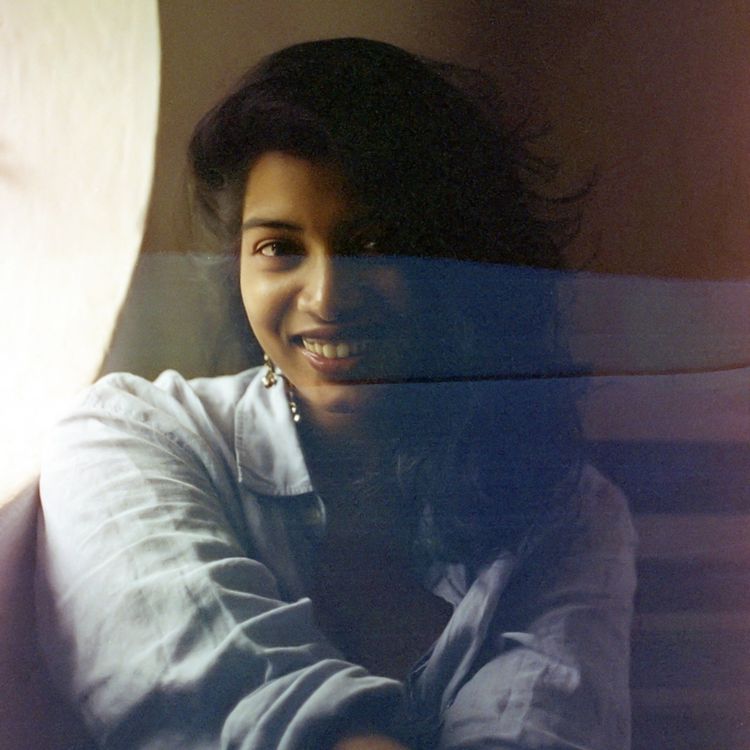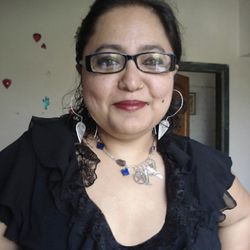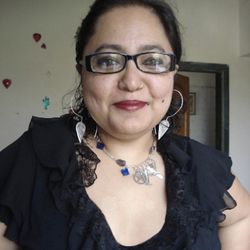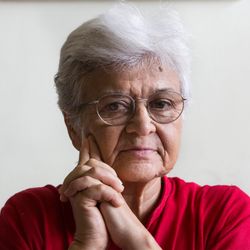Share

Reading List Leaders
Reading List Leaders Podcast 1
In the first Reading List Leaders podcast, Vidha Saumya hosts illustrator, designer and co-founder of the Dalit Panther Archive Shrujana Niranjani Shridhar.
Shrujana’s readings include: an excerpt from Black Independence Day written by Raja Dhale for Sadhna Magazine in 1972 for Indian independence day; Don’t Bail Me Out by Namdeo Dhasal, a poem penned by Dhasal after he was jailed in the early seventies in India; and Using Little Magazines for Fame is Foolishness, an essay by Raja Dhale lamenting people who publish little magazines just because it’s ‘cool’ to do so.
Languages: Marathi, English
Shrujana Niranjani Shridhar is an illustrator and designer practicing in Mumbai. She completed her Diploma in Visual Communication and Art from Srishti School of Art, Design and Technology, Bengaluru. Her practice revolves mainly around children’s literature and illustrations. In 2016, she co-founded the Dalit Panther Archive, which has been documenting the Dalit Panther movement of the 1970s. Her research interests revolve around the exploration and definition of a Dalit aesthetic that has existed in the Indian sub-continent for centuries, in its myriad heterogenous forms. Her work examines socio-political relations, especially at the intersection of gender, caste, and class.
Photo by Shone Satheesh.
More episodes
View all episodes

Reading List Leaders Podcast 4
54:32|In the fourth Reading List Leaders podcast, Vidha Saumya hosts stand-up comedian, organiser and artist Arvind Ramachandran.Arvind Ramachandran and Vidha Saumya will discuss topics such as: 1) Expanding the reading list: How do we expand reading lists to include not just often ignored authors, but also often ignored forms of writing, or even non-writing forms of content. 2) Sharing the reading list: How does what one reads find its way to reach others? 3) Transplanting the reading list: We move. In an age of migration, how do our reading lists reflect our stories. Languages: Tamil, English About Arvind RamachandranArvind Ramachandran is a stand-up comedian, organiser and artist. His work focuses on confronting visible and invisible oppressive structures operating in contemporary society, especially as they affect those without class, caste, gender and race privileges. He currently co-organises the Feminist and Anti-Racist Night School and co-hosts PoC Open Mic in Helsinki.
Reading List Leaders Podcast 3 - Part 1
42:55|In the third Reading List Leaders podcast, Vidha Saumya hosts filmmaker, writer and public speaker, Paromita VohraParomita’s readings include: Love in the Time of Protests, published February 2020 in The Indian Express; My True North: All renewal starts with the self, December 30, 2018 in The Indian Express; The Tip Of Your Tongue, published May 2016 in the Mid-Day; Enquirational Me, published May 29 2016 in the Mid-Day; Speaking in Tongues, published September 2015 in the Mid-Day; At Political Peace, published April 2010 in the Mid-Day; and Is the covid-19 pandemic a perfect opportunity for humans to introspect? Published April 2020 in The Economic Times.Language: EnglishAbout Paromita VohraParomita Vohra’s work mixes fiction and non-fiction to explore themes of desire, sex, love, urban life, popular culture and feminism. Her work spans various forms – film, sound installation, digital media, writing, interactive workshops and acting – and has been broadcast internationally, shown in museums such as the Tate Modern, Wellcome Collection and the National Gallery of Modern Art and has taught in universities around the world. She is the founder and creative director of Agents of Ishq, a first-of-its-kind digital project about sex and love in India. She writes two weekly columns – ParoNormal Activity in Sunday Midday and How to Find Indian Love in Mumbai Mirror.
Reading List Leaders Podcast 3 - Part 2
39:45|In the third Reading List Leaders podcast, Vidha Saumya hosts filmmaker, writer and public speaker, Paromita VohraParomita’s readings include: Love in the Time of Protests, published February 2020 in The Indian Express; My True North: All renewal starts with the self, December 30, 2018 in The Indian Express; The Tip Of Your Tongue, published May 2016 in the Mid-Day; Enquirational Me, published May 29 2016 in the Mid-Day; Speaking in Tongues, published September 2015 in the Mid-Day; At Political Peace, published April 2010 in the Mid-Day; and Is the covid-19 pandemic a perfect opportunity for humans to introspect? Published April 2020 in The Economic Times.Language: EnglishAbout Paromita VohraParomita Vohra’s work mixes fiction and non-fiction to explore themes of desire, sex, love, urban life, popular culture and feminism. Her work spans various forms – film, sound installation, digital media, writing, interactive workshops and acting – and has been broadcast internationally, shown in museums such as the Tate Modern, Wellcome Collection and the National Gallery of Modern Art and has taught in universities around the world. She is the founder and creative director of Agents of Ishq, a first-of-its-kind digital project about sex and love in India. She writes two weekly columns – ParoNormal Activity in Sunday Midday and How to Find Indian Love in Mumbai Mirror.
Reading List Leaders Podcast 2
46:49|In the second Reading List Leaders podcast, Vidha Saumya hosts writer, activist and social scientist Kamla Bhasin.Kamla’s reading list includes: Corona Ke Zamaane Mein (In the Times of Corona), written on March 26, 2020; Kya Main Make-up Karti Hoon (Do I Use Make-Up); Yeh To Meri Marzi Hai (It’s My Wish); Mere Naarivaad (My Feminisms); Aao Hum Auratien Apni Jagah Banayein (Let’s Make Space); Khamoshi (Silence); Khoobsoorat Ya Khoobseerat (); Me Too; Because I Am A Girl, I Must StudyThese simple poems are sung by feminist groups in various countries in South Asia.Languages: Hindi-Urdu, English About Kamla BhasinA social scientist by training, Kamla Bhasin has been actively engaged with issues related to gender, education, identity politics, militarization, human rights and democracy since 1970. She has written extensively on gender, women’s empowerment, participatory and sustainable development, participatory training, media and communication. Currently, she works with ‘Sangat’ – A Feminist Network as Adviser; ‘JAGORI’ – A Women’s Resource and Training Centre; and ‘Jagori Rural Charitable Trust’ as an active member. She is the South Asia Coordinator of’ One Billion Rising’ – a global campaign to end violence against women and girls; Co-Chair of the worldwide network ‘Peace Women Across the Globe’; and member of ‘South Asians for Human Rights (SAHR)’. Prior to this, she worked with the Food and Agriculture Organization of the United Nations for 27 years.Summary of Kamla Bhasin’s poemsKya Main Makeup Karti Hoon? (Do I Use Makeup?)In this free-verse poem, Kamla Bhasin does a wordplay on the use of make-up, as a word and as an action. Asked innocently by a woman in her audience if she uses make-up, Kamla responds, yes, I do, I make up my mind, make-up my dreams, makeup my intentions, makeup promises. not satisfied with the answer, the woman asks again, “But do you use make-up on your body and face?”. Unperturbed, Kamla replies, “Yes, I do. I have had a close and long relationship with my body, I respect it, I accept it as it is, I don’t compare my body with beauty queens, and since I am in love with my body, I decorate it, I spend an hour only with my body, I take it out on a walk, strengthen its limbs through yoga, all my life I’ve refined my body, and the body supported me all along, we’ve both turned 73, my body and I, and we’ve both leaned on each other through this life. But, dear friend, my makeup if you mean what I call fake-up, then that is something I haven’t done. My face, body, it’s features and its colour are appealing to me in their original form, I haven’t succumbed to the market of beauty, I have avoided all that is fake - fake faces too. So my dear, curious friend, people have had to like me just as I am and as they lovingly stroke my silver hair or laugh alongside my countless wrinkles, they’ve shown they’re not affected by my ageing body because I am always just as I have been...”…Hum Sikandar Hain, Shikaar Nahin / We Are Winners, Not PreyThis poem narrates the difference between a victim and a survivor. It says that patriarchy may have assigned us as being a victim - a pawn, a stooge, gullible and weak, oppressed, unaware. We are preyed upon in the confines of our own homes and often the assailant is our own kin. Whether in the form of foeticide, infanticide, hunger, unattended, neglect, rape, property-less, and often by simply curbing our freedom. But now it's time for some good news. The good news is that even if not all, but many women are no longer weak, incoherent, we no longer care for what others may say, our hearts don't cry helplessly, were no longer oppressed, entrapped. We are committed, alive, strong. We are no longer prey, we are winners. We are forerunners of our own destiny. We persevere but are not looking for conflict. Neither are we a prey not want to prey on anyone. We know the trauma of being oppressed and hence we foresee a world where there are no unequals, where we freedom and happiness are found at all intersections.